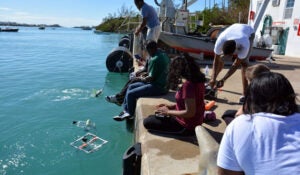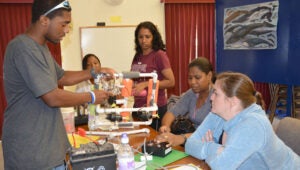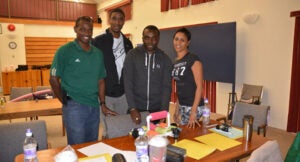Teachers On Board with MARINE: Mid Atlantic Robotics IN Education

This past month, sixty primary and middle school educators from the Bermuda Union of Teachers came to BIOS to participate in a professional development workshop focused on marine robotics. The workshop involved PVC pipes, car batteries, foam noodles, propellers, and a race against time as participants were challenged to build their own Remotely Operated Vehicles (ROVs) for launch into the Sargasso Sea. Successful ROVs are neutrally buoyant and can be maneuvered through the water to complete tasks, mimicking the professional classes of underwater robotics used around the world to collect data for science and industry.
The workshop kicked off MARINE, a new education initiative at BIOS and the current topic of the HSBC Explorer program. The fresh focus on marine robotics reflects BIOS’s recent acquisition of Anna, a bright-yellow Slocum glider, and a commitment to expand the use of underwater technology to better understand ocean processes.
MARINE will provide materials for students to build ROVs, and use ROV design challenges to inspire students and enhance learning in science, technology, engineering and mathematics (STEM). Building an ROV incorporates many foundational curricular concepts – like buoyancy, density, and circuits – into one meaningful project. By helping educators get practical experience with the process and learn more about related research at BIOS, it will be easier for them to integrate these resources into their classrooms.
After spending extra time troubleshooting challenges during their lunch break and cheering on their plucky PVC-pipe robots at the BIOS dock, one thing was clear: “If the teachers are anything to go by, the students are really going to love working with robots,” said J.P. Skinner, the Director of BIOS’s Ocean Academy. Reflecting on their workshop experience, the teachers commonly spoke about the power in a hands-on approach using teamwork, with one teacher commenting, “It’s a perfect example of how to engage all learners/learning styles into the STEM process.”

“We are excited for what MARINE can contribute to Bermuda’s middle school students,” said Science Education Officer Kaitlin Baird. “We think its an opportunity to open doors to career opportunities in marine technology while fostering core workforce skills like teamwork, active listening, and critical thinking.”
Students who build ROVs in the classroom in association with MARINE will have the opportunity to showcase their skills and teamwork as they pilot their ROVs through MARINE’s underwater competition. The competition will be held at the National Sports Center pool on March 7th, 2015. Teams interested in participating should visit /education/marine/ and submit an application form by December 12th.

